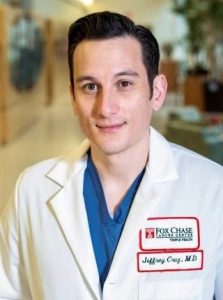No Question He Brought Skills to His Volunteer Assignment
By Rodney Campbell, ABR Communications Manager
2025;18(5):9

If there were a job description used when the ABR seeks volunteers to write exam questions, it would include the disclaimer, “No prior experience required.”
Jeffrey Cruz, MD, is an exception.
Dr. Cruz, who writes vascular and interventional radiology questions for the Diagnostic Radiology Qualifying (Core) Exam, came to the ABR with a background in the skill. As an assistant residency program director for interventional radiology at Penn State Hershey Medical Center, he established and developed content for an end-of-rotation exam for his trainees.
“Having taken the boards, I had an idea of what it was like,” he said. “When I started doing it, I realized I liked it. It was just a little puzzle, a little game, and it also had a point. After that, I decided I wanted to try it on the ABR level and applied.”
Now an assistant professor for clinical radiology at the Lewis Katz School of Medicine at Temple University and assistant professor for diagnostic imaging at Fox Chase Cancer Center, Dr. Cruz started as an ABR volunteer in 2021.
In the past four years, he has evolved from novice to experienced committee member. Learning to write effective exam questions takes time and involves being open to ideas offered by more seasoned colleagues.
“I think volunteers are really good at receiving feedback,” Dr. Cruz said. “I know that it’s helped me tremendously in terms of knowing what’s a good image and what’s a good way of phrasing a question. All those things really help piece it together for you.”
Emily Cuthbertson, MD, is a new member of Qualifying Exam committee. A colleague of his at the Lewis Katz School of Medicine, she has received important tips about writing exam questions from Dr. Cruz.
“He is an incredible resource for me as a new member of the exam committee,” Dr. Cuthbertson said. “Given the fact that he now has several years of experience on the committee, his advice has been invaluable. I appreciate being able to bounce my ideas for question writing off him to get his opinion.”
Even with the advantage of having written questions for residents in his old position, Dr. Cruz knows the value of good advice because he had to learn on the job.
“The first year is tough,” he said. “You’re adjusting, you don’t yet know the metrics that they use, and you’re trying to figure that all out. After that first year, when we sat down at a committee meeting and were choosing questions for the exam, we had to swap some questions. A couple of my questions came up and we ended up using them.”
Gaining a national perspective on how residents are trained also helps volunteers produce better questions. The ABR strives to recruit physicians and physicists from across varied regions who represent different practice settings, from academics to private practice.
“You only teach at one institution, so you don’t know what the entire country is doing,” Dr. Cruz said. “The practice of IR can be so different between institutions. It was hard to figure out the appropriate question that gave everyone a fair shot. But once you figure that out, it makes things easier.”
Originally interested in pursuing surgery, Dr. Cruz turned to interventional radiology when an attending suggested it during his residency at Einstein Medical Center in Philadelphia. He spent a day watching procedures that changed his career plans.
“It was amazing,” he said. “I felt like until that point for a lot of specialties, you had either been pigeonholed into knowing a lot about a little or a little about a lot but for IR, in order to be pretty good, you needed to know a lot about a lot.”
Like most candidates, Dr. Cruz didn’t know the extensive process involved with developing ABR exam questions when he was a resident. He believes that it would help trainees to know that content goes through multiple reviews before questions are approved. Sometimes, a question can be invalidated after an exam if it performed poorly.
“I didn’t realize how much time and effort goes into every question,” he said. “There have been hours of work done on each one.”
The ABR covers travel expenses for volunteers but doesn’t pay a stipend. Dr. Cruz said that having the opportunity to meet and learn from people from his field and beyond while giving back to his profession makes the work and time involved easy to justify.
“It’s the interactions that I have with people and the chance to expand my network of friends within the specialties,” Dr. Cruz said. “That’s a reward in itself. I get to work with these people who I respect and come up with great questions. That helps me grow professionally as well.”


